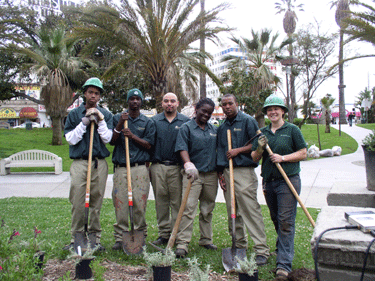April 28, 2006
Air Date: April 28, 2006
FULL SHOW
SEGMENTS
Beyond CAFÉ
/ Jeff YoungView the page for this story
Despite pain at the pumps and profits for oil companies, fuel efficiency standards for cars have been stuck in political gridlock for nearly 20 years. Washington correspondent Jeff Young reports on alternative routes to efficiency, including an idea called "feebates" that might be coming to your state. (07:00)
Who Killed the Electric Car?
View the page for this story
As one documentary tells it, the story of the EV-1, General Motors’ all-electric car, is short and bittersweet. Host Steve Curwood talks with movie reviewer Dan Bree about the film “Who Killed the Electric Car,” and who done it. (05:00)
Que Viva La Tierra
/ Ingrid LobetView the page for this story
Latinos have been active on smog and asthma issues for several years, but some leaders want to broaden that into a new Latino activism for urban parks and greenspace. Living on Earth's Ingrid Lobet reports. (06:00)
An Afternoon with Pete Seeger
View the page for this story
Bruce Springstein’s new CD, “We Shall Overcome, The Seeger Sessions,” pays tribute to the songs of singer, songwriter and activist Pete Seeger. A few years ago, Living on Earth spent some time with the folk music legend who told host Steve Curwood that it was Rachel Carson's book “Silent Spring” that inspired him to become active on environmental matters. One of Seeger’s goals was to clean up New York’s Hudson River and he built a boat he called “Clearwater” to educate the public about pollution. Host Steve Curwood met Pete Seeger at the Sloop Club on the banks of the river in Beacon, New York and has this profile. (25:00)
This week's EarthEar selection
listen /
download
Ringing in May Day.
Show Credits and Funders
Show Transcript
HOST: Steve Curwood
GUESTS: Dan Bree, Pete Seeger
REPORTERS: Jeff Young, Ingrid Lobet
[THEME MUSIC]
CURWOOD: From NPR, this is Living on Earth.
[THEME MUSIC]
CURWOOD: I’m Steve Curwood. People are hoping the latest spike in gas prices is temporary, but some worry that they may go up even more. And while efforts to tighten mileage standards for cars have been stuck on Capitol Hill for decades, there is a new movement afoot to offer cash back to buyers of high mileage cars.
LOVINS: I think if we had a good feebate system the CAFE argument would become irrelevant.
CURWOOD: But critics say surcharges on gas guzzlers could hurt the wrong folks.
SHOSTECK: Feebates are discriminatory against people who require a large vehicles either for work or family purposes or both.
CURWOOD: Also, GM used to make an electric car that used no gas at all. A new documentary asks, “Who Killed the Electric Car?”
BREE: There are a lot of suspects and all of them have some measure of guilt.
CURWOOD: Those stories and more this week on Living on Earth, Stick around.
[NPR NEWSCAST]
ANNOUNCER: Support for Living on Earth comes from the National Science Foundation, Stonyfield Farm and Kashi, whose “Day of Change” tour features yoga, lessons, natural food cooking demos, and an array of Kashi products. Details at Kashi dot com.
[THEME MUSIC]
Beyond CAFÉ
CURWOOD: From the Jennifer and Ted Stanley Studios in Somerville, Massachusetts, this is Living on Earth. I’m Steve Curwood.
Big profits for oil companies and high prices at gas stations have pumped up the rhetoric on energy policy in Washington. As a gallon of gas rose to more than three dollars in many areas, profits for oil companies accelerated. Valero Refining soared 60 percent. And Exxon Mobil banked nearly $8.5 billion in profits for the first quarter of 2006.
This latest round of record profits recorded by oil and refinery companies has some folks scratching their heads at a seeming contradiction: If oil supplies are so tight, how come the profit margins are so huge?
House Democratic leader Nancy Pelosi was quick to point to the finger at Republicans.
PELOSI: Record prices for the American people, record giveaways, record profits for big oil companies. That's the Republican energy policy and Americans can no longer afford it.
CURWOOD: Democrats want to tax big oil profits and make sure companies aren’t gouging consumers. President Bush says he’ll investigate allegations of price fixing and ease environmental regulation on some blends of gas. Other than that, the President says we should stay the course set by last year’s Energy Act—which many Democrats, including Illinois Senator Dick Durbin opposed.
DURBIN: Since that bill was signed what's happened to the price of energy and gasoline? It's gone up dramatically across America. That bill was a failure.
BUSH: I think we need to follow suit on what we have been emphasizing, particularly through the energy bill, and that is to encourage conservation, to expand domestic production, and to develop alternative sources of energy like ethanol. [APPLAUSE]
CURWOOD: This is the second time in less than a year that gas prices have rocketed. Still, the movement to raise fuel economy standards for autos remains stuck in park on Capitol Hill. Most energy analysts say higher standards for the Corporate Average Fuel Economy, called CAFÉ could cut oil consumption.
The Bush administration modestly increased CAFÉ standards for light trucks this year. But car standards date back two decades. Now, there’s a new route being tried around this political roadblock. Living on Earth's Jeff Young reports.
YOUNG: CAFÉ standards have a proven track record for saving oil. In an eight year span, the U.S. cut oil consumption by nearly a fifth, oil imports fell by half – all while the economy grew. But David Friedman with the Union of Concerned Scientists says that’s all in the rear view mirror of our energy history.
FRIEDMAN: For about 20 years those standards really haven’t gone anywhere. The political will just hasn’t been there.
YOUNG: But some politicians are exploring other ideas. One bill with bipartisan support in Congress would set a target for oil reduction, but leave open details on how to meet the target. That bill and others would also expand existing tax breaks for buying hybrid cars. Still others would offset health insurance costs for automakers if those companies make more fuel efficient cars. Energy conservation guru Amory Lovins traveled from his Rocky Mountain Institute to Capitol Hill to push another idea, called “feebates.”
LOVINS: I think if we had a good feebate system the CAFÉ argument would become irrelevant.
[CARS PASSING AT CAR LOT]
YOUNG [AT CAR LOT]: The feebate idea is pretty simple: a mix of fees and rebates for each class of vehicle, according to fuel efficiency. So, if I walk onto this car lot and buy a gas guzzler, I pay a hefty fee. If I pick a gas sipper – say this one here, it’s rated at 34 miles per gallon– well, then I get a rebate. Lovins and other proponents say if the fees and rebates are big enough to get my attention, that puts the lifetime cost of fuel for that car right up front in my decision on what car to buy, and that would harness the market in a ways that current incentives don’t.
[SOUND FROM CAR LOT SEQUES TO PEOPLE MILLING ABOUT IN CONFERENCE ROOM]
YOUNG: After a recent Congressional hearing, Lovins found an unlikely ally in his feebate argument – former CIA director Jim Woolsey. Woolsey worries that oil dependence harms national security. The two teamed up on Ford executive Sue Cischke, who was bemoaning the cost of making hybrids.
CISCHKE: We are basically subsidizing the Ford Escape even though right now we’re charging $3,400 more. And there are tax incentives to help the consumers. It’s still costing us far more than that. So, we do have to drive the cost of that down
WOOLSEY: The feebates would be so much more effective than CAFÉ.
CISCHKE: There are problems with that in terms of who is paying whom and all that…
LOVINS: Are you the right person to talk to about starting a private dialogue on feebates?....
YOUNG: It’s informal huddles like these in the halls of Congress that can give proposals political traction on Capitol Hill. And though Cischke was non-committal, Lovins was happy to have planted the germ of the idea with yet another auto executive.
LOVINS: It turns out automakers, as well as consumers, will make more money this way, as some of the automakers are starting to figure out.
YOUNG: Rebates, after all, give consumers money to buy cars. But then there are those fees.
SHOSTECK: Feebates are discriminatory against people who require large vehicles either for work or family purposes or both.
YOUNG: Eron Shosteck is spokesperson for the Alliance of Automobile Manufacturers, representing nine major car companies on three continents.
SHOSTECK: A rancher who requires a heavy duty pickup truck has to go over rutted terrain, has to be able to haul heavy loads, understands that there’s a trade-off with fuel economy but requires that vehicle to do his job. That is an unfair tax on that person.
YOUNG: That kind of message from industry helped sidetrack previous attempts at feebate programs in California and Maryland and also makes it unlikely the federal government will act. But Friedman, of the Union of Concerned Scientists, says half a dozen states are again considering feebates.
FRIEDMAN: At the federal level there really is no political will to honestly tackle global warming or to honestly tackle oil dependence. But at the state level that is happening. So part of the advantage is you could create a groundswell at the states by getting these feebates out there, and then eventually maybe Washington will wake up.
YOUNG: There are questions about the details. Just how much energy would be saved? And what level of fee or rebate will change consumer behavior? Steve Nadel with the American Council for an Energy Efficient Economy says he’s not looking for perfection from such a program. He’s looking for action.
NADEL: I think the key point is we’ve been stuck in the mud for almost a couple decades now. We need to do something, we need to get this ball rolling. It’s less important the exact policy or the perfect policy. But let’s start to make progress.
YOUNG: Conservation activists say high gas prices should bring more than just pain at the pumps – they could provide the political gas to get the U.S. serious about fuel efficiency. For Living on Earth, I’m Jeff Young in Washington.
Related links:
- David Friedman, Union of Concerned Scientists, on Pres. Bush Speech on Gas Prices
- Amory Lovins’ “Winning the Oil Endgame” articles
- The Alliance of Automobile Manufacturers
- National Petrochemical & Refiners Association
Who Killed the Electric Car?
CURWOOD: There’s a documentary film making its way through the festivals this year, and its unlikely hero is winning audiences from Sundance to San Francisco. The film is called “Who Killed the Electric Car,” and the star is the EV-One, the smart little electric two-seater from GM that was designed to be totally gas and emission-free. But, as the title suggests, the story is not a happy one. In fact, it’s a bit of a murder mystery. And joining me to tell us whodunit is television producer Dan Bree, who reviewed the film for Grist Magazine. Dan, hello.
BREE: Hi, Steve.
CURWOOD: So Dan, give me a little setup here. Who are the cast of characters in this film?
BREE: Well, the cast of characters are everyone from the oil company executives to the American consumer to the environmental activists. Everyone who had a stake in a type of car being produced that can reduce pollution. You also have, of course, the car itself. The GM EV-1, which was formally introduced by the less-than-stellar name “Impact.” It’s small, it’s low-slung. It doesn’t look like your typical American car. It looks more like something you’d see on a European Autobahn. But you have all of its supporting cast of characters – the Toyota, Honda, and other electric cars that came out.
CURWOOD: Now, I don’t want you to give away the ending just yet, but tell me what happens in the story.
BREE: Well, the story is really about what happens when a technology comes out that threatens the status quo. And what GM did is they introduced a product that essentially made all of their previous products obsolete and irrelevant – and that is a car that does not need oil on which to run. So when this car comes out, of course you have a huge cadre of people on the American consumer side, the environmental side, who think to themselves, you know, great, this is the solution to all of our problems.
And then, meanwhile, back in corporate headquarters, the company’s realized that this very product that they’ve just introduced could spell the end to their industry. And so they basically set about trying to prevent its success.
CURWOOD: On the pollution point, I mean, yeah, the electric car doesn’t pollute out of a tailpipe, but someone’s got to make the electricity, and coal’s certainly a form of pollution.
BREE: Yes, that’s true. I think what the filmmakers try to make the point of is that single-source pollution – such as you find out a electric plant – is much easier to control and regulate than multi-source pollution, which is pollution that comes out of millions of tailpipes. So the electric car, despite the fact that it runs on electricity, really is much better at reducing our pollution use.
CURWOOD: What were some of the scenes in this film that really made, dare I say, an impact?
BREE: [LAUGHS] Well, some of the scenes that really gripped the audience at Sundance were the scenes in which you have people at the end realizing that this car may be actually taken away from them. They had been reclaimed by GM, and by the other companies who never really sold them. They only leased them with the specific intent, essentially, of being able to reclaim them when they wanted.
So you have these environmental activists and car activists – people who just love this car with a passion – sprinting around Los Angeles identifying parking lots where cars are sitting there in tens and twenties. And when they actually are attempting to take them away it’s very, very emotional. You have these stand-off scenes. It’s an emotional film. It’s a very emotional film.
CURWOOD: Okay, let’s cut to the chase here. Who is the culprit? Who ultimately killed the electric car?
BREE: Well, I don’t want to give away the ending, but let’s just say that there are a lot of suspects and all of them have some measure of guilt. I think that’s what the filmmakers are trying to say, is that the electric car was killed by a number of interests – a number of entrenched interests – and, in their estimation, by the collective apathy of the American consumer who was essentially interested in large cars that can do everything. Haul the kids around to school, drive 300 miles on ten tanks of gas, as it were. There’s a lot of people at fault here, a lot of people with guilt.
CURWOOD: Dan, is this the final swan song for the electric car? Or could this film, given the high gas prices we’ve seen recently, help bring the EV-1 or some other electric car back to life?
BREE: I think what this film is going to do is it will remind us that we have options. And I think what this may actually do is it may spur the development of alternate car companies who are smaller and who may say, hey, you know, there’s a lot of people who are interested in this and we can do a lot to protect the environment by producing these new types of cars.
CURWOOD: Dan Bree is a television producer in northern California. “Who Killed the Electric Car” will be showing at the Tribeca Film Festival starting May 2. Dan, thanks for taking this time today.
BREE: Thank you, Steve.
Related link:
“Who Killed the Electric Car?” website
[MUSIC: Michael Mish “My Electric Car” from ‘Mish Mash Music Sampler’ (Mish Mash Music - 2004)]
CURWOOD: Coming up: Earth Day, Latino-style. Stay tuned to Living on Earth.
[MUSIC: Pete Seeger “Coal Creek March” from ‘A Link in the Chain’ (Sony – 1961)]
CURWOOD: It’s Living on Earth. I’m Steve Curwood. And coming up: The Boss - and the man with a banjo. But first:
Que Viva La Tierra
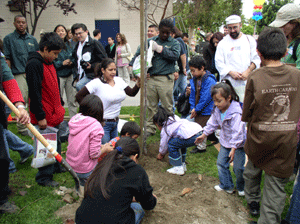
The group Mujeres de la Tierra plants a tree in Bell, CA (Photo: Ingrid Lobet)
CURWOOD: Latinos have become increasingly active in environmental causes. For many out West, the link has been asthma and air pollution. Now, some political activists are trying to broaden the focus and create a Latino urban greening agenda, beginning in the sun-baked grayscape of Los Angeles. They hope to seize this moment while hundreds of thousands of Latinos are already mobilized against harsh anti-immagration proposals. Living on Earth’s Ingrid Lobet reports from a bus tour of several Latino Earth Day events.
MAN: So, just go ahead and browse around, huh?
WOMAN: Yeah, help yourself to food. There's burritos, there's bread, there's coffee now.
MAN: Thank you, ma'am.
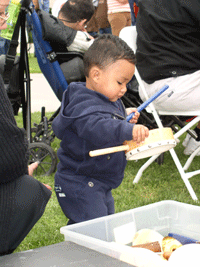
(Photo: Ingrid Lobet)
[ACCORDIAN MUSIC]
LOBET: Last year, for the first time, there was a Latino Earth Day observance here. A single event. This year there are five celebrations, so there's a bus to go between them.
MAN: Diez, nueve, ocho…
LOBET: As it shoves off, spirits are high.
GROUP OF PEOPLE: Three, dos uno, andale! Let's go. [CLAPPING, ACCORDION]
[BUS NOISE; STREET AND STAGE NOISE]
GONZALEZ: Bueno dias! The idea behind all of this is that as Latinos we have to fight to protect our environment. Our air quality, our water, and community health. We must mobilize for the environment the same way we have taken action on immigration.
LOBET: That’s Antonio Gonzalez, a major figure in Latino politics. He heads two key organizations – the Southwest Voter Registration Project and the William C. Velasquez Institute, which organized the bus caravan.
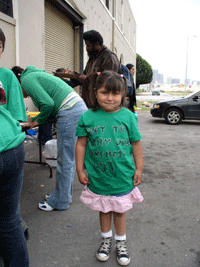
A little girl shows off her shirt which says “Don’t Take Away Our Dreams” as Earth Day events begin in L.A. (Photo: Ingrid Lobet)
LOBET: Gonzalez says he's well aware of the need to sell his agenda to his constituents. That's why he's here today. But he says some mainstream environmental groups need to yield in their thinking, too. For example, it won't work to frame environmental problems, as some in the Sierra Club argued recently, as too many people.
GONZALEZ: They have to understand that this is a reinterpreted agenda. We have a slogan that we like to use: "From tofu to chile verde." We're not going to eat tofu. Chile verde is just as good.
[SOUND OF DIGGING]
LOBET: Nearby in a park that residents and police have wrenched back from drug dealers, Darnell Jackson and Maynard Jimenez in the Los Angeles Conservation Corps are wishing more people would do what they do every day – plant trees.
|
Darnell Jackson and Maynard Jimenez of the L.A. Conservation Corps (2nd and 3rd from left) on Earth Day. (Photo: Ingrid Lobet) [SHOVELING SOUND]JIMENEZ: They say, ‘what are you guys doing?’ We are fixing up your park. They say, ‘oh, you know, that's cool.’ They like it. It makes me happier. JACKSON: It's amazing, actually, because we can look back on it later on and say, ‘yeah, we helped do this, we helped better the community.‘ JIMENEZ: It is a bad area of LA, but we make it look decent, at least. LOBET: Serenading the youths from a few yards away is a group of university students from Guatemala City. Another group that’s pushing for parks and planting trees here, a Latino youth soccer association, invited the students up from Guatemala who have come up just for this event. [ANDEAN MUSIC] [AIR BRAKES, BUS COMES TO A STOP] MAN: Good afternoon everybody. I want to welcome you to the South Central Farm. This is a project that has been running for 14 years. LOBET: Another stop takes the caravaners to, what organizers say is, the largest urban community garden in the United States. The owner of this 14-acre parcel has been fighting to evict the gardeners and develop the property. MAN: Community growing food, fresh produce, healthier food on their table and help out their families.  The group Mujeres de la Tierra plants a tree in Bell, CA (Photo: Ingrid Lobet) WATERS: This garden, this land is so precious because not only does this land feed people, this land helps us to breathe in South Central Los Angeles! WOMAN: Thank you for visiting the South Central Farmer on Earth Day. Please take your plants, take your plantitas. [BUS STARTS] LOBET: The bus starts for home. It’s been a long day. The take away message, organizers hope, is “speak up.” RAUL HINOJOSA: We didn’t hear you. El que no habla, Dios no lo oye. YARELI ARIZMENDI: El que no habla organizadamente ....Dios no lo oye. LOBET: As the saying goes in Spanish; if you don’t speak up, God won’t hear you. For Living On Earth, I’m Ingrid Lobet in Los Angeles. [MUSIC: Accordion Music by Nicolas Valdez - Andean Music by Estudiantina de la Universidad de San Carlos de Guatemala (Los Angeles – 2006)] CURWOOD: You can hear our program anytime on our website or get a download for your iPod or other personal listening device. The address is loe@org. You can reach us at comments@loe.org. Our postal address is 20 Holland St. Somerville, MA 02144. And you can call our listener line at 800-218-9988. CDs and transcripts are $15. An Afternoon with Pete Seeger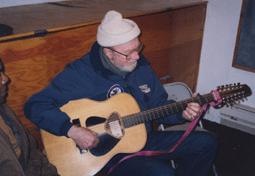
[MUSIC: Bruce Springsteen “O Mary Don’t You Weep” from ‘We Shall Over Come – The Seeger Sessions’ (Bruce Springsteen - 2006)] CURWOOD: Okay, don’t worry – you don’t have to get up and check to see if your radio tuner has slipped off its assigned frequency. This is not the Sunday Morning Gospel Hour. This is Living on Earth, and I’m Steve Curwood, and you’re listening to Bruce Springsteen singing “O Mary, Don’t You Weep” from his new recording “We Shall Overcome: The Seeger Sessions.” [MUSIC: Bruce Springsteen “O Mary Don’t You Weep” from ‘We Shall Over Come – The Seeger Sessions’ (Bruce Springsteen - 2006)] CURWOOD: As you can hear, it’s a rowdy and raucous, hand clappin’, foot stompin’ collection of classic American folk songs, along with a handful of ballads – part hootenanny, part church choir, part protest rally. For Springsteen, this new recording is a long way from “Thunder Road.” But it’s not that much of a detour from a path that has ventured into the folk music genre from time to time, and has certainly influenced earlier works like “Nebraska” and “The Ghost of Tom Joad.” 
We thought this is a good opportunity to feature a piece we did on Pete Seeger a few years back, so that, like Springsteen, you can get to know him, too. [MUSIC UP AND UNDER] [AUDIENCE CLAPPING] SEEGER: (Singing) I've lived all my life in this country. I love every flower and tree. I expect to live here till I'm 90. It's the nukes that must go and not me. AUDIENCE: (Singing) It's the nukes that must go and not me. The nukes that must go and not me. I expect to live here till I'm 90. It's the nukes that must go and not me. CURWOOD: That's Pete Seeger leading a crowd in an anti-nuclear song at a Harvard University gathering back in 1980. For some in the audience, this may be the apex of their protest days. For Pete Seeger, it's another night on the town as the nation's troubadour of conscience. America's tuning fork, some call him. For more than half a century, Pete Seeger has been leading people throughout the world in song, and in the process he's become a walking history of folk music and social activism. In the 1930s and '40s, you'd find him and his famous banjo on the union picket line. SEEGER: (Strumming banjo) Now you want higher wages, let me tell you what to do. Got to talk to the workers in the shop with you. You got to build you a union, got to make it strong. But if you all stick together, boys, 'twon't be long. You get shorter hours. Better working conditions. Vacations with pay, take the kids to the seashore... CURWOOD: Singing songs with outspoken political views led Pete Seeger in 1955 to the House Un-American Activities Committee. Congress wanted him to testify about alleged Communist affiliations. Name names, it was called. Mr. Seeger refused, was ordered to jail, and blacklisted. An appeals court blocked his prison term, and Pete Seeger kept on singing. In the 1960s it was songs for civil rights and against the war in Vietnam. SEEGER: (Singing) The sergeant said, "Sir, are you sure this is the best way back to the base?" "Sergeant go on, I fought at this river about a mile above this place. It'll be a little soggy but just keep sloggin', we'll soon be on dry ground. We were waist deep in the big muddy, the big fool says to push on... CURWOOD: And ever since then it's been the environment. In 1969, with the help of other musicians and activists, Pete Seeger built a sloop he christened the Clearwater, because that was his intention: to clear the waters of the Hudson River of pollution and garbage. Pete Seeger lives on the Hudson, in a small quiet town called Beacon, about an hour north of New York City, and just 30 miles from where he was born. For decades, he and his neighbors have met on the river's banks at the Sloop Club to socialize and organize over potluck suppers. He's asked us to meet him there, where it's his turn to set up for this month's gathering. A bright red pickup truck loaded with logs and plywood pulls up. A tall, wiry man with a white beard and glasses jumps out. (DOOR SHUTTING) SEEGER: Hope you haven't been waiting too long. CURWOOD: Nope, how are you? Pete Seeger has lived eight decades, but he moves with the ease and energy of someone who still has a lot to do. (To Seeger) Mr. Seeger, you got here a Ford Ranger, except it didn't make much noise when you pulled up. SEEGER: I bought it for $8,000. A schoolteacher who teaches electricity wanted to learn more about electric cars, so he made his own electric car. And he put into it a 28-horsepower electric motor, and 20 6-volt batteries. CURWOOD: Can I see under the hood? SEEGER: Sure. [HOOD OPENS] SEEGER: Not much here. CURWOOD: Nope. Except a sign that says, "Caution, wear rubber gloves. You could be electrocuted." (Laughs) SEEGER: Right. There's like 400 amps. For me it's perfect. I live on a very steep mountainside and I'm always carrying rocks and logs, and with a low range and 4-wheel drive I can inch up the steepest kind of slope with a ton of logs. It can go a foot a minute if I want to go that slowly, because I just feed in more or less power with the accelerator. I'd be burning out the clutch if I was using a regular gasoline car. CURWOOD: Let's go over here by the -- your docks here out of the water and we can chat a bit. What a place for a sunset, huh? [WATER LAPPING ON SHORE] SEEGER: This waterfront was a tangle of weeds, and the river was like an open sewer 30 years ago when the Clearwater started. And little by little it's gotten better. That park over there was our big victory. We petitioned and petitioned and people laughed at us, but, by gosh, the petitions finally had an effect. And a little city money and a lot of federal and state money -- a million dollars to make a park out of seven and a half acres of garbage. CURWOOD: Aha. Pete Seeger, how'd you get involved in environmental concerns? SEEGER: It was Rachel Carson's famous book "Silent Spring." I read it in The New Yorker, in installments. Up to then I'd thought the main job to do is help the meek inherit the Earth. And I still, that's a job that's got to be done. But I realized if we didn't do something soon, what the meek would inherit would be a pretty poisonous place to live. And so I made almost 180-degree turn, started reading books like "The Population Bomb" by Paul Erlich, or "The Poverty of Power" by Barry Commoner. I'm a readaholic. And I was reading a book about the sailboats that sailed here, oh, all during the 19th century. Alexander Hamilton wrote one of the Federalist Papers on his way to Poughkeepsie in a sloop, where they were arguing whether or not to sign the Constitution idea and agree to it. Well, I write a letter to my friend: wouldn't it be great to build a replica of one of these? Probably cost $100,000. Nobody we know has that money, but if we got 1,000 people together we could all chip in. Maybe we could hire a skilled captain to see it's run safely and the rest of us could volunteer. And three years later the sloop Clearwater was built up in Maine, and I helped sail it down with Don McLean and a batch of other singers. And now it takes school kids out. It's not a rich man's cruise boat. Two or three times a day it takes groups of 50 school kids out, teaches them what makes rivers dirty and what's got to be done to clean them up. Of course, people say what can a sailboat do? It can't do much except bring people together. But when people come together, that's when miracles happen, right? CURWOOD: What do you think it's done for the river? SEEGER: It drew attention to it in such a friendly way that people couldn't help getting attracted. In the little town of Cold Spring south of here, there were some very conservative people who thought it was a Communist, treasonous project, because I was involved with it. 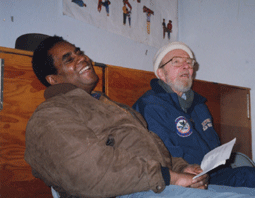 Steve & Pete share a laugh. SEEGER: I told people at age seven I became a Communist when I read about American Indians. And anthropologists, that's the term they use for the way our ancestors lived anywhere in the world. The men hunted, the women gathered berries and dug for roots and carried babies on their back. And somebody killed something to eat, the meat was shared. That's communism. I admit, it seems romantic to want to go back to that, but I really do believe that if there is a world here, if there's a human race here in 100 years, we will have learned how to share again. CURWOOD: Indeed. SEEGER: Well, down in this little town, a man came down to see the Clearwater, and he beckoned to me. He said, "Seeger, can I talk to you a minute?" I said, "Sure." He said, "I don't want you to think I agree with you, not one tenth of one percent, but that sure is a beautiful boat." He couldn't take his eyes off it. [CURWOOD LAUGHS] Hundred-and-six foot tall the mast goes up. I call it a symphony of curves. There are hardly any straight lines on a sailboat and very few right angles. Curves, curves. [SINGING WHILE PLAYING GUITAR] Sailing down my golden river. Sun and water all my own. Yet I was never alone. Sun and water are all life givers. I'll have them where'er I roam. And I was not far from home. That was the first Hudson River song I wrote. The Clearwater had not been built. I hadn’t even thought of the idea. I was sailing a little plastic boat and there I looked at the water beneath me. There was lumps of this and that floating by with the toilet paper. And the phrase of John Kenneth Galbraith came to mind. “Private affluence, public squalor.” I had money to buy this little plastic boat. We had money to go to the moon. But we didn’t have money to keep the rivers clean. And later on, I was sailing by myself and I saw the sun go down and the sky turned from yellow, to pink, to purple, to midnight blue, and I had [SINGING] sailing down my golden river sun and water all my own, but I was never alone. CURWOOD: We’ll be back with more music and musing from Pete Seeger in just a minute or so – so keep listening to Living on Earth. ANNOUNCER: Support for NPR comes from NPR stations, and: Kashi, whose “Day of Change” tour features yoga, lessons, natural food cooking demos, and an array of Kashi products. Details at Kashi dot com; The Kresge Foundation, investing in nonprofits to help them catalyze growth, connect to stakeholders, and challenge greater support. On the web at Kresge dot org; The Annenberg Fund for excellence in communications and education; The W-K Kellogg Foundation. 'From Vision to Innovative Impact: 75 Years of Philanthropy' This is NPR -- National Public Radio. [MUSIC: Pete Seeger “Nameless Lick” from ‘Waist Deep in the Big Muddy and Other Love Songs’ (Sony - 1967)] CURWOOD: It’s Living on Earth. I’m Steve Curwood. We continue now with our story on the life, times and music of Pete Seeger, and we pick up with Pete’s recollection of the origins of one environmentally-minded song he likes to sing called: “Garbage.” CURWOOD: Let's talk about some other songs. Garbage. 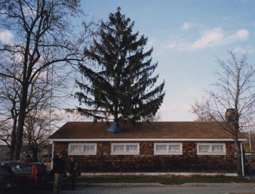 The Beacon Sloop Club has a tree growing through the roof. Well, then he went on to say and so the water gets dirty in Long Island Sound, but I changed the words: [SINGS] And if you question anything they say why don't you see? It's absolutely needed for the economy. Garbage, garbage, garbage, their stocks and their bonds, all garbage. What will they do when their system goes to smash? There's no value to their cash. There's no money to be made. But there's a world to be repaid. Their kids will read in history books about financiers and other crooks, and feudalism and slavery and nukes and all their knavery. To history's dustbin they're consigned along with many other kinds of garbage, garbage, garbage... You know, I drew blood with that verse? I sang it on “The Today Show” once, and Fortune magazine says, "Esso was sponsoring that program. Do they know what songs are being sung with their money?" [CURWOOD LAUGHS] And they quoted the verse I'd sung. I don't necessarily like to draw blood. I'd rather persuade people to laugh and eventually agree that maybe I've got a little right on this side. Incidentally, the only way I got it on “The Today Show” was by -- I have to confess -- a little bit of devious preparation. I knew that NBC wouldn't be happy about me singing it. I come in at 6:30 in the morning; they say, "Pete, what are you going to sing?" I said, "Well, I've got a cheerful little banjo tune; I've got something else a little more serious." "Well, let's hear them." Played the banjo tune. "Fine, what's the other?" I sang “Garbage.” They say, "Well, Pete, it's a little early in the morning. You got something else?" I was prepared. I sang [SINGS}: Walking down death row... They say, "Pete, you got something else?" [SINGS] If a revolution comes to my country... 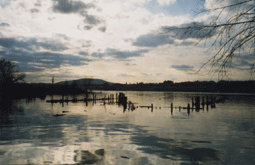 Dusk on the Hudson River, off the shores of Beacon, N.Y. [SINGS]: Mr. Thompson starts his Cadillac, winds it down the freeway track, leaving friends and neighbors in a hydrocarbon haze. He's joined by lots of smaller cars all sending gases to the stars, there to form a seething cloud that hangs for 30 days. And the sun blinks down into it with an ultraviolet tongue, turns it into smog, then it settles in our lungs. Oh! Garbage, garbage garbage... We're filling up the sky with garbage. What will we do when there's nothing left to breathe but garbage?... CURWOOD: You've spent a lot of time with Woody Guthrie. I'm thinking of Woody Guthrie's song “Roll On Columbia” in which he speaks in such glowing terms of the dams that are there. SEEGER: Yeah. I think if Woody was around now, he would find some funny song. He was wonderful at combining tragedy and humor, all in one song. He did have a funny verse: Them salmon fish are pretty shrewd. They've got politicians, too. Run every 4 years. [CURWOOD LAUGHS] CURWOOD: What's the most important thing when it comes to the environment? SEEGER: I tell people, work in your local community. The world's going to be saved by people who fight for their homes. Now, there may be glamorous places to go to, far across the oceans on, but really the world's going to be saved by people who fight for their homes. CURWOOD: Is there a song that you'd like to talk about in connection with, you know, working in your own community, working in your town, to make the environment better? SEEGER: Well, a lot of songs are about it. [SINGS] Inch by inch, row by row, gonna make this garden grow. It's “The Garden Song,” written by a fellow up in the state of Maine, and Arlo Guthrie and I and lots of others have recorded it. I've also written a little song I sing on the general subject of praying, because I think church people and non-church people should find ways to get together. It was just about a year ago, a little over a year ago, I was out getting wood to start the morning fire. We heat our house with wood. And I look up and see the sun poking itself up over the mountain. [SINGS] Early in the morning, I first see the sun, I'll say a little prayer for the world. Hope all the little children live a long, long time. Every little boy and little girl. Hope they'll learn to laugh at the way some precious old words seem to change, 'cause that's what life is all about: to arrange and rearrange and rearrange. And I have a little chorus: [SINGS] Oh, whee, oh why, to rearrange and rearrange and rearrange. Oh whee, oh why, to rearrange and rearrange and rearrange. You get the audience singing it. CURWOOD: Come on, you guys. [LAUGHS] SEEGER: You'll have to help me out, next time. It's like a zipper song; anything nice that happens you can have a new verse. For me, it was ten and a half years ago, one A.M. our son-in-law Shabazz knocks on the door: "The baby's coming!" I said ‘have you called the midwife?’ "Yes, yes, she's bringing two friends." Well, so we called up a couple friends. It was a party for three and a half hours. Our daughter beamed like she was in heaven, and on occasion she'd let out a shriek and then beam some more. And after three and a half hours her firstborn, who was six years old at the time, says, "I see the head! I see the head!" [SINGS] Heard the first yowl of a brand new baby, and I said a little prayer for the world. Hope all the little children live a long, long time, yes every little boy and little girl. [CLAPS] Hope they'll learn to laugh at the way some precious old words do seem to change. 'Cause that's what life is all about: to arrange and rearrange and rearrange. Sing it with me. BOTH: [SINGING] Oh whee, oh why, to rearrange and rearrange and rearrange. Oh whee, oh why, to rearrange and rearrange and rearrange. SEEGER: [SINGS] Well, sometimes I wake in the middle of the night and rub my achin' old eyes. Is that a voice from inside my head, or does it come down from the skies? There's a time to laugh but there's a time to weep, a time to make a big change: wake up, ya bum! The time has come to rearrange and rearrange and rearrange. Sing it again! BOTH: [SINGING] Oh whee, oh why, to rearrange and rearrange and rearrange. Oh whee, oh why, to rearrange and rearrange and rearrange. (Laughter) SEEGER: I've tried to write lots of songs, but I have to admit that it's one thing to try and write a song and another thing to write one good enough for people to want to remember and sing. Woody Guthrie wrote 1,000 songs and there's maybe a dozen which will be widely sung. And a friend of mine had started a small record company, and he says, "Pete, would you be able to put out a record of some of your own songs?" I said, "My voice is gone, it's too wobbly, too raggedy. When I stand on a stage mainly what I do is get the audience singing; I accompany them. I line out the hymn, as they say in church. But he says, "What if I get other people to sing them?" I said, "Fine, if you can find them." Well, by gosh, he got some awful well-known singers: Bruce Springsteen and Bonnie Raitt and Billy Bragg and Judy Collins and a whole lot of others, put out 2 CDs, mainly of songs that I wrote. And other songs like “We Shall Overcome.” All I did was make an arrangement of them. SPRINGSTEEN: [SINGS] Hey, we shall overcome. We shall overcome. We shall overcome some day. Darlin', here in my heart, yeah I do believe we shall overcome some day. Well, we'll walk hand in hand. We'll walk hand in hand... 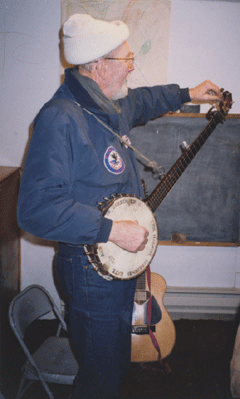 Pete tunes his banjo. SEEGER [CLAPPING AND SINGING WITH AN AUDIENCE]: We shall overcome. We shall overcome. We shall overcome some day. Oh, deep in my heart, I know that I do believe, oh we shall overcome, someday. We shall live in peace! We shall live in peace. We shall live in peace. We shall live in peace some day -- ohhh, deep in my heart I do believe we shall overcome someday -- The whole wide world around!... [TO CURWOOD]: Saving the world is not going to be easy. It's going to require huge arguments. People who call themselves environmentalists don't always agree. One says, "Don't have any dams," but along comes a man and says, "If you have a lot of small dams they won't do any damage, or not enough, and saves burning fossil fuels." Who knows what's going to happen? All I know is I wish I could live another 30 or 40 years, because some of the most exciting things are going to happen. When I meet people who say, "Oh, there's no hope, Peter, look at the things that are going wrong, and those stupid people in Bosnia, there are going to be things like that all around the world, where power-hungry people says 'I know how to handle this, just give me the bomb.' There's no hope." But I say to them, I said, "Did you think that our great Watergate president would leave office the way he did?" "No, I guess I didn't think that." I said, "Did you think that the Berlin Wall would come down so peacefully?" "No, I didn't think that would happen, yeah." I said, "Did you think Mandela would be president of South Africa?" "No, I didn't predict that." "Well, if you couldn't predict those three things, then don't be so confident that there's no hope." And I give them a bumper sticker. It says, "There's No Hope, But I May Be Wrong." [CURWOOD LAUGHS] (SEEGER STRUMS GUITAR) CURWOOD: Pete Seeger, thanks so much for taking this time with us on Living on Earth today. SEEGER: Thank you for inviting me. CURWOOD: What's it say on your banjo here? It says -- SEEGER: "This machine surrounds hate and forces it to surrender." I hope. [STRUMS GUITAR AND SINGS]: Well may the world go, the world go, the world go. Well may the world go when I'm far away. Well may the scales turn, the swimmers churn, the lovers burn. Peace may the generals learn when I'm far away. [SINGS WITH OTHERS] Well may the world go, the world go, the world go. Well may the world go when I'm far away. [BANJO MUSIC] CURWOOD: Our visit with Pete Seeger was produced by Eileen Bolinsky and Jesse Wegman. [MUSIC: Pete Seeger “Well May The World Go” from ‘Pete Seeger & Arlo Guthrie – Together in Concert’ (Rising Son Records – 1975)] CURWOOD: We leave you this week ringing in the month of May. [BELLS RINGING] CURWOOD: Steven Feld recorded the festivities held in Oslo, Norway each year to celebrate May Day, the international day of the worker. [EARTH EAR: “Oslo May Day” recorded by Steven Feld from ‘The Time of Bells: Volume 2’ (VoxLox/Earth Ear – 2004) CURWOOD: Living on Earth is produced by the World Media Foundation. Our crew includes Ashley Ahearn, Chris Ballman, Jennifer Chu and Bruce Gellerman - with help from Christopher Bolick, Kelley Cronin, and James Curwood. Our interns are Bobby Bascomb and Emily Taylor. Our technical director is Dennis Foley. Alison Dean composed our themes. You can find us at LOE dot org. I’m Steve Curwood. Thanks for listening. ANNOUNCER: Funding for Living on Earth comes from the National Science Foundation, supporting coverage of emerging science; Kashi, whose “Day of Change” tour features yoga, lessons, natural food cooking demos, and an array of Kashi products. Details at Kashi dot com. Stonyfield Farm. Organic yogurt, smoothies, and milk. Ten percent of profits are donated to efforts that help protect and restore the earth. Details at Stonyfield dot com. Support also comes from NPR member stations, the Ford Foundation, the William and Flora Hewlett Foundation, and the Saunders Hotel Group of Boston's Lennox and Copley Square Hotels. Serving you and the environment while helping preserve the past and protect the future, 800-225-7676. ANNOUNCER 2: This is NPR. National Public Radio. Living on Earth wants to hear from you!Living on Earth Newsletter [Click here]
Donate to Living on Earth! NewsletterLiving on Earth offers a weekly delivery of the show's rundown to your mailbox. Sign up for our newsletter today!
|

